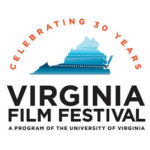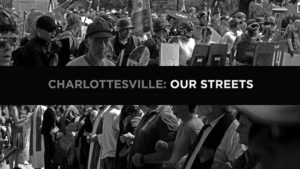Having its world premiere at the Virginia Film Festival exactly three months after the events of August 12 [1] that it portrays, the Rashomon [2]-like “Charlottesville: Our Streets [3]” appears while psychic and physical wounds are still raw and the political repercussions — especially for local government — have not yet been fully played out.
On Sunday in front of a packed house at the Paramount Theater, the producers of “Charlottesville: Our Streets,” Jackson Landers (who also wrote the screenplay) and Brian Wimer (who also directed), participated in a post-screening panel discussion [4] moderated by radio host Coy Barefoot, along with journalist colleague Natalie Jacobsen and two interview subjects from the film.
[youtube https://www.youtube.com/watch?v=Nz81d1HHmlg&w=560&h=315]
The movie drew both applause and jeers as it featured comments from both the neo-Nazis and Confederate nostalgists who invaded Charlottesville for the so-called “Unite the Right” rally over the weekend of August 11-12, and various counterprotesters from the clergy, antifa, and regular folks opposed to racism and anti-Semitism.
 Landers and Wimer endeavored to be as objective as possible, letting the interviews and images tell the story and putting the burden of drawing conclusions on the audience, whose members are intelligent enough to interpret what they see.
Landers and Wimer endeavored to be as objective as possible, letting the interviews and images tell the story and putting the burden of drawing conclusions on the audience, whose members are intelligent enough to interpret what they see.
Using a combination of talking-head interviews and “found footage” from among hundreds of hours of video taken by dozens of amateur and professional photographers on the scene that day, “Charlottesville: Our Streets” shows the chaos and the violence in a nearly unfiltered manner. Much of the video has not been previously seen by anyone other than those who took it, and one takeaway is that what did make its way to television news programs pulled its punches.
The violence was much worse than I had thought, based on the news reports I had seen, and the film shows clearly how the local and state police failed to intervene when the street fights began, standing at a distance and observing without taking action. As former Charlottesville Mayor Dave Norris says in an interview in the film, anyone who asserts there was no “stand-down” order is being “deceitful.”
 I earlier referred to “Our Streets” as Rashomon-like [5], and this is borne out by its multiple points of view. One of the things that struck me was how, in almost every shot, there were several other cameras making their own recordings of the same scene from different angles. What those photographers captured could well compose another movie from which entirely different conclusions could be drawn.
I earlier referred to “Our Streets” as Rashomon-like [5], and this is borne out by its multiple points of view. One of the things that struck me was how, in almost every shot, there were several other cameras making their own recordings of the same scene from different angles. What those photographers captured could well compose another movie from which entirely different conclusions could be drawn.
“Charlottesville: Our Streets” does not yet have a distributor, but the producers hope to take it to other film festivals and to college campuses around Virginia and beyond. Their aim is to return Charlottesville’s name to what it was before it became a hashtag.
Full disclosure: Jackson Landers and I, along with Shaun Kenney, are weekly guests on Coy Barefoot’s radio program [6] on 94.7 WPVC-FM [7] in Charlottesville, where we discuss local, state, and national politics for an hour beginning at 5:00 o’clock each Monday afternoon. The events of August 12 have been a frequent topic of our conversation since even before they occurred.